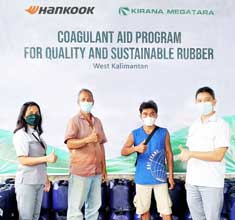South Korean tyre company Hankook Tire says it is furthering its commitment to enhance the sustainability across its value chain for natural rubber, a primary raw material for tyres, announcing that it will provide formic acid to rubber farmers in West Kalimantan, Indonesia.
The production of tyres accounts for about 70? of global natural rubber consumption, and approximately 85% of global rubber production relies on smallholders in Southeast Asia. The production of natural rubber begins with a small rubber lump, created through coagulation of natural rubber latex collected by the farmers. Various types of coagulants are used for rubber lump manufacturing, but some could affect safety of farmers and ecosystem.
To tackle the issue, Hankook Tire will provide formic acid, an eco-friendly coagulant, to local rubber farmers in Indonesia. Formic acid is more environmentally friendly in that it brings less damage to trees and that there is a lower risk of water pollution unlike other coagulants that can be a threat for wet land biodiversity. Formic acid can also provide safety at work with lower toxicity and being less irritant. Hankook decided to sponsor a total of 6,000 litres of formic acid to more than 100 natural rubber famers of Kirana, an Indonesian rubber processor.
This is in line with Hankook’s efforts for sustainability as a member of Global Platform for Sustainable Natural Rubber (GPSNR), an international membership driven platform set up to define sustainability for the natural rubber value chain. Hankook established a sustainable natural rubber policy in 2018 and has updated it last year in compliance with the new GSPNR policy across diverse fields such as human rights, environmental protection and management transparency. In terms of environmental protection, prevention of deforestation, prevention of water pollution caused by the use of chemicals, prevention of resource depletion, and prohibition on development or procurement of peatland farming of natural rubber are regulated.
Recently, Hankook also participated in the blockchain-based natural rubber traceability and sustainability project called PROJECT TREE. Organised by Itochu Corporation, an international trading firm, this was the first attempt to establish traceability using blockchain in the natural rubber industry. Eventually, Hankook aims to help improve the quality of life of the natural rubber cultivators, upgrade quality of natural rubber and minimize environmental impact together with its supply chain partners.

